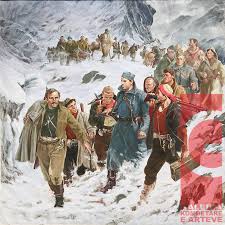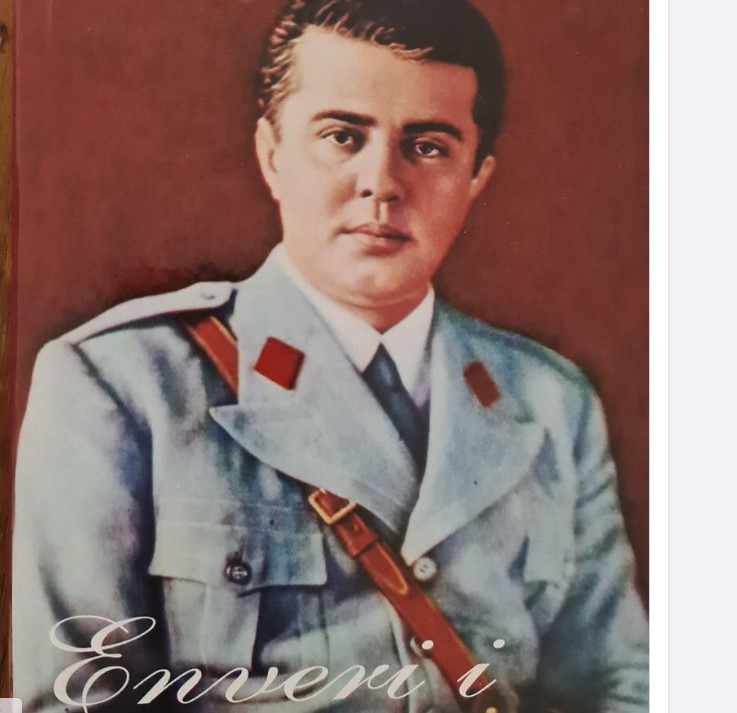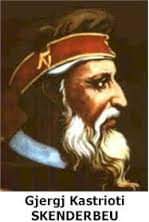Posted byVictor VaughnMarch 3, 2012
Posted inAlbania, Anti-Imperialism, Asia, Capitalism & Bourgeois Liberalism, Capitalist Exploitation, Capitalist Restoration and Counterrevolution, China, Class Struggle, Common Sense, Enver Hoxha, Europe, History, How Will Communism Work, Imperialism & Colonialism, Internationalism, Kautskyism, Khrushchevism/ Brezhnevism, Lies & Propaganda, Life in Socialist Countries, Maoism, Marxism-Leninism, Myth-Busting, Revisionism, Revolutionary Quotations, Science, Socialist Revolution, The Classics, The Union of Soviet Socialist Republics (U.S.S.R.), Theory, Titoism, Trotskyism
“[The Party of Labor of Albania] has waged and is waging the class struggle in the correct Marxist-Leninist way, inside and outside the Party, and this is the motive force during the whole period of the transition from capitalism to socialism.”
— Enver Hoxha, 1968 Selected Works Vol. IV p. 427, “The Working Class in the Revisionist Countries Must Take the Field and Re-Establish the Dictatorship of the Proletariat”
“The ideological and cultural revolution is a part of the general class struggle to carry the socialist revolution through to the end in all fields. Contrary to the views of the modern revisionists, who have declared the class struggle in socialism outdated and a thing of the past, our Party holds that class struggle remains one of the main motive forces of society, even after the exploiting classes have been eliminated. This struggle includes all fields of life. It has its ebbs and flows and zigzags, sometimes it surges up, sometimes it falls back, sometimes becomes fierce, at other times more «mild», but it never ceases and dies right away.”
— Enver Hoxha, Selected Works Vol. IV, p. 165, “Report to the 5th Congress”
“Acceptance or non-acceptance of the class struggle in socialism is a question of principle, it is a line of demarcation between Marxist-Leninists and revisionists, between revolutionaries and betrayers of the revolution. Any deviation from the class struggle has fatal consequences for the future of socialism.”
— Ibid.
“The revolution overturns a whole world, let alone a single tradition. Since the class struggle goes on during the whole period of the construction of socialist society and the transition to communism, and since political parties express the interests of specific classes, the presence of other non-Marxist-Leninist parties in the system of the dictatorship of the proletariat would be absurd and opportunist, especially after the economic base of socialism has been built.”
— Enver Hoxha, 1967, Selected Works Vol. IV, p. 307 “On the Role and Tasks of the Democratic Front in the Struggle for the Complete Triumph of Socialism in Albania”
“In practice we often come across a narrow concept on the class struggle and class enemy, which regards only the kulaks and other elements of the former exploiting classes, or the imperialists and Titoite and Khrushchevite revisionists abroad as class enemies, and only the struggle against their anti-socialist activities as class struggle. The struggle against these enemies remains, as always, a primary task for our Party, our state and our working people. But we should take a broader view of the class struggle. It is a many-sided struggle which is, first and foremost, an ideological struggle today, a struggle for the minds and hearts of people, a struggle against bourgeois and revisionist degeneration, against all alien remnants and phenomena which still exist and manifest themselves in various degrees among all our people — it is a struggle for the triumph of our communist ideology and morality.”
— Enver Hoxha, Selected Works Vol. IV p. 166, “Report to the 5th Congress”
“The issues we are raising at this Plenum are closely linked with a major cardinal problem, that of the understanding and development of the class struggle in the proper way. The Party has long made it clear that the class struggle is one of the main motive forces of our socialist society, that it is a very broad struggle which is waged in all fields, both against internal and external enemies and within the ranks of the people and the Party, and that in the existing conditions the class struggle on the ideological front assumes special importance.”
— Enver Hoxha, 1973, Selected Works Vol. IV, 848, “Intensify the ideological Struggle Against Alien Manifestations and iberal Attitudes Towards Them”
“The struggle for the communist education of the working people against the remnants and manifestations of alien ideologies, old and new, constitutes the broadest and most complex front of the class struggle which is going on in our country. This struggle becomes especially important and acute in the present conditions when our country is forging ahead in the construction of socialism, relying entirely on its own forces, when the struggle between socialism and capitalism, Marxism-Leninism and revisionism in the international arena has become extremely severe and when the imperialist-revisionist encirclement and its pressure on our country have become more ferocious.”
— Enver Hoxha, Selected Works Vol. VI, pp. 372-373.
“The modern revisionists with the Soviet ones at their head claim that all class struggle ends with the elimination of the exploiting classes. This is a hoax which serves to disarm the working class and lull it into sleep and this way pave the path for the restoration of capitalism. This has been most clearly shown in the Soviet Union and in other former socialist countries where the new capitalist bourgeoisie seized power.
The experience of our country refuted these false and capitulationist theories of the disappearance of class struggle under socialism. The whole history of the construction of socialism in Albania is a story of uncompromising struggle between revolution and counter-revolution, between the two paths of development, against the internal and external enemies both within the people and the Party. This struggle has been waged continuously and always vehemently. Only its forms and methods have changed according to the circumstances and stages of development. Even after elimination of the exploiting classes as classes the inner and outer enemies have not for a single moment laid down their arms or halted their fight against socialism. Therefore our party and our people have waged the class struggle with strict consistency and in a correct Marxist-Leninist way in all areas as a crucial condition for the final victory of the socialist way over the capitalist.”
— Enver Hoxha, “Proletarian Democracy is Genuine Democracy”
“Which of them will triumph? Marx and Lenin, Marxist-Leninist science, the theory and practice of the revolution, provide us with convincing proof that, in the final analysis, the proletariat will triumph by destroying, overthrowing the power of the bourgeoisie, imperialism and all, exploiters, and will build a new society, socialist society. They teach us also that even in this new society, classes, that is, the working class and working peasantry, which are closely allied to each other, will exist for a very long time, but there will also be remnants of the overthrown and expropriated classes. During this entire period, these remnants, as well as elements which degenerate and oppose the construction of socialism, will try to regain their lost power. Hence, under socialism, too, stern class struggle will exist.”
— Enver Hoxha, Imperialism and the Revolution
“Thus he (Mao) does not see the socialist revolution as a qualitative change in society in which antagonistic classes and the oppression and exploitation of man by man is abolished, but conceives it as a simple change of places between the bourgeoisie and the proletariat.”
– Enver Hoxha, Imperialism and Revolution
“The class struggle continues and will continue in the period of the construction of socialist society, but we have the impression that in China this struggle is not carried out consistently, is weak and not based on sound and lasting principles. When there are vacillations in line there will certainly be wavering stands towards enemies.”
— Enver Hoxha, Reflections on China Vol. II, p. 147
“Only once, Chou [en-Lai], this liberal and opportunist element, when he came to our country made a criticism of us, allegedly that our Party was not waging the class struggle. When we faced him with the facts, telling him that during its whole existence our Party had waged a stern class struggle inside and outside our country, as well as within the ranks of the Party itself, he was obliged to beg our pardon, saying, «I do not know the history of your Party as well as I should».”
— Enver Hoxha, Reflections on China Vol. II, p. 241
“But Mao also put forward other theses and views with which we have never been in agreement. He wrote a good deal about the class struggle, about contradictions, etc., but the class struggle in China, in practice especially, has not been waged sternly and consistently.”
— Enver Hoxha, Reflections on China Vol. II, 283
“Liu Shao-chi, this revisionist, had delivered a whole report to the comrades of one of our delegations about the alleged rightist mistakes of Stalin, alleging that Stalin had said that the class struggle was over, etc. What irony! And who was saying this? The person who, at the 8th Congress of the Communist Party of China, advocated coexistence with the capitalists! L iu Shao-chi emerged as the Chinese Khrushchev!”
— Enver Hoxha, Reflections on China Vol. 1 , p. 328
“Even within the party a class struggle must be waged, indeed a stern struggle, to totally liquidate the anti-party, anti-Marxist faction as quickly as possible.”
— Enver Hoxha, Reflections on China Vol. 1 , p. 358
“He proves with scientific argument why the class struggle will continue until the construction of communism and why the fate of socialism depends on the correct understanding of this struggle which is waged in a coordinated manner on the internal and external plane, why socialism is threatened not only from abroad, by a military aggression, but also from within the country, by degeneration and peaceful counter-revolutionary evolution.”
— Enver Hoxha, Selected Works Vol. IV, Forward, p. VIII
“The exploiting classes could not be eliminated immediately, either in our country or in the other socialist countries. A fierce political and ideological fight, a violent war with arms, a stern and continuous class struggle under the unwavering leadership of the Marxist-Leninist party is needed for the proletariat to wrest political power by violence from the hands of the exploiting capitalist class and establish the state of the dictatorship of the proletariat in order to eliminate the economic base of the exploiting class and private property in general, to eliminate the capitalist relations of production and establish socialist social ownership and the socialist relations of production, to turn the existing socialist property into the property of the entire people; and simultaneously, to build a new socialist superstructure, by radically purging every remnant of bourgeois and petty-bourgeois policy and ideology from the consciousness of the people.”
“Hence, our Party believes that, notwithstanding that the exploiting classes have been liquidated, the danger of bourgeois and revisionist restoration always exists if you rest on your laurels and do not advance at a great revolutionary tempo, if you are not guided in everything by Marxism-Leninism, if you cease the class struggle instead of waging it consistently and uninterruptedly, if you weaken the dictatorship of the proletariat instead of further strengthening it, if you divorce yourself from the people instead of linking yourself with them as closely as possible, if you prove cowardly instead of being valiant and courageous and in continuous, dauntless, unrelenting struggle against imperialism, revisionists of all hues and all lackeys of the bourgeoisie and capital.”
“As you know, we have had a controversy over principles with the Chinese comrades, not mainly over the class struggle, but about “the existence of the feudo-bourgeois class as a class, as an entity which fights us, even from positions of state power, at a time when state power in our countries is the dictatorship of the proletariat.” We know what our thesis is and this we base on our struggle, on facts and on Marxist-Leninist analysis. The Chinese comrades have claimed the contrary. As you know, we have told them that it may be so in their country, but not in ours, because the class struggle in our country has been waged and continued consistently from the time of the National Liberation War and since the war right to this day, and it will go on against the remnants of the feudo-bourgeois class, etc., etc. There is no bourgeoisie in power in our country.”
— Enver Hoxha, Selected Works Vol. IV, p. 98, “Some Preliminary Ideas about the Chinese Proletarian Cultural Revolution”


Shënim:
Redaksia, diplomacia. dk nuk e merr përgjegjësinë për pikëpamjet e autorit në shkrimin e botuar!
Respekt!
